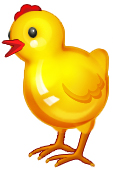You have thought about the words “extract,” “yank,” and “snake” in the introduction. Now study another example of connotation and denotation, one that is more emotional and more controversial.

Source: Microsoft Clip Art
Look at the picture to the left. What do you see? If you answered “chick” you would be correct. Chick in this instance refers to the dictionary definition of a baby chicken. Since it’s the main dictionary meaning, it’s the denotation of the word.
Now look at the next picture. What does “chick” refer to?

Source: Microsoft Clip Art
Chick means a woman or girl this time. There’s a cultural connection to the picture and the word, so we call this the connotative meaning of the word “chick.” Some members of society have determined that a young woman can be a “chick,” and this emotional connection may be positive or negative. Referring to a young girl, a boy may say “She’s a cute chick.” The girl may find this a compliment or be offended, depending on her experience with the word. When the word “chick” is acceptable, it is always in a casual, friendly setting. In a business or work setting, for example, the word “chick” would probably carry a negative connotation if used to refer to a female colleague. To better understand negative, neutral, and positive connotations, visit this website at the University of Ottawa.
To have a negative connotation toward people who have “no fixed address,” we might use the word vagrant. Vagrant has a negative emotional quality that describes people who are not only homeless, but also trespassing on another person’s property. It is also implied that “vagrants” somehow “choose” to live in this manner. If a writer uses the word “homeless,” however, this may mean that the absence of housing is temporary and readily fixed. As an audience, we seem to have more sympathy when the word “homeless” is used to describe a person without a permanent residence. Writers carefully choose the words they use so that the literal implied meanings are clear to their audience. Keep this in mind as you continue on in this lesson.
 The list that follows contains nine pairs of words that evoke either negative or positive feelings. For each pair, click the plus or minus sign beside each word to indicate whether it conveys a more favorable response (+) or a more a negative response (-). Clicking on the symbol will highlight your choice. If it helps, you can use your notes to write a note about why a word suggests a positive or negative meaning to you. After making your selections, check your understanding to see the most likely responses.
The list that follows contains nine pairs of words that evoke either negative or positive feelings. For each pair, click the plus or minus sign beside each word to indicate whether it conveys a more favorable response (+) or a more a negative response (-). Clicking on the symbol will highlight your choice. If it helps, you can use your notes to write a note about why a word suggests a positive or negative meaning to you. After making your selections, check your understanding to see the most likely responses. | + + | or | − − | Plain | Natural | + + | or | − − |
| + + | or | − − | Clever | Sly | + + | or | − − |
| + + | or | − − | Cackle | Giggle | + + | or | − − |
| + + | or | − − | Snob | Cultured | + + | or | − − |
| + + | or | − − | Cop | Officer | + + | or | − − |
| + + | or | − − | Skinny | Slender | + + | or | − − |
| + + | or | − − | Statesman | Politician | + + | or | − − |
| + + | or | − − | Smile | Smirk | + + | or | − − |
| + + | or | − − | Domineering | Assertive | + + | or | − − |
Sample Responses:
| − | Plain | Natural | + |
| + | Clever | Sly | − |
| − | Cackle | Giggle | + |
| − | Snob | Cultured | + |
| − | Cop | Officer | + |
| − | Skinny | Slender | + |
| + | Statesman | Politician | − |
| + | Smile | Smirk | − |
| − | Domineering | Assertive | + |
If some of your choices don’t agree with the chart, that’s fine. Remember sometimes whether a word is positive or negative is determined by society and experience. The important thing here is that you understand that many words carry additional emotional meanings.